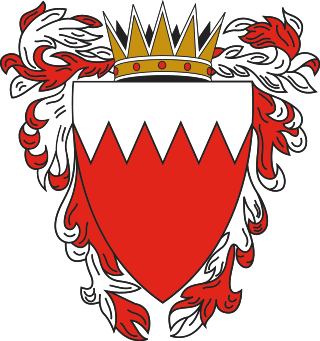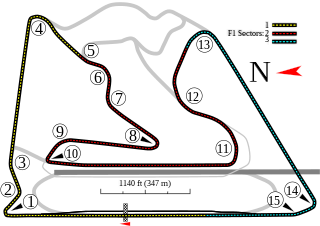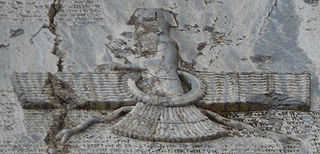See also
- List of years by country
| Early history | |
|---|---|
| 19th century | |
| 20th century | |
| 21st century | |
This is a list of years in Bahrain . See also the timeline of Bahraini history. For only articles about years in Bahrain that have been written, see Category:Years in Bahrain.

Manama is the capital and largest city of Bahrain, with an approximate population of 200,000 as of 2020. Long an important trading center in the Persian Gulf, Manama is home to a very diverse population. After periods of Portuguese and Persian control and a short invasion from the ruling dynasty of Saudi Arabia, followed by a longer invasion by Oman, Bahrain established itself as an independent nation in 1971 following a period of British hegemony.

The economy of Bahrain is heavily dependent upon oil and gas. The Bahraini Dinar is the second-highest-valued currency unit in the world. Since the late 20th century, Bahrain has heavily invested in the banking and tourism sectors. The country's capital, Manama is home to many large financial structures. Bahrain's finance industry is very successful. In 2008, Bahrain was named the world's fastest growing financial center by the City of London's Global Financial Centres Index. Bahrain's banking and financial services sector, particularly Islamic banking, have benefited from the regional boom driven by demand for oil. Petroleum is Bahrain's most exported product, accounting for 60% of export receipts, 70% of government revenues, and 11% of GDP. Aluminium is the second most exported product, followed by finance and construction materials.

Bahrain plays a modest, moderating role in regional politics and adheres to the views of the Arab League on Middle East peace and Palestinian rights. Since achieving independence in 1971, Bahrain has maintained friendly relations with most of its neighbours and with the world community. It generally pursues a policy of close consultation with neighbouring states and works to narrow areas of disagreement.
Baḥraynunā is the national anthem of Bahrain. Originally composed as an instrumental in 1942, lyrics were added in 1985, which were changed in 2002 following the country's transformation from an emirate into a kingdom.

The Bahrain Grand Prix, officially known as the Gulf Air Bahrain Grand Prix for sponsorship reasons, is a Formula One motor racing event in Bahrain. The first race took place at the Bahrain International Circuit on 4 April 2004. It made history as the first Formula One Grand Prix to be held in the Middle East, and was given the award for the "Best Organised Grand Prix" by the FIA. The race has in the past been the second, third, or fourth race of the Formula One calendar. However, in the 2006 season, Bahrain swapped places with the traditional opener, the Australian Grand Prix, which was pushed back to avoid a clash with the Commonwealth Games. In 2010, Bahrain staged the opening race of the 2010 season and the cars drove the full 6.299 km (3.914 mi) "Endurance Circuit" to celebrate F1's 'diamond jubilee'. In 2021, the Bahrain Grand Prix was the season opener again because the 2021 Australian Grand Prix was cancelled due to the COVID-19 pandemic.

The Bahrain International Circuit is a 5.412 km (3.363 mi) motorsport venue opened in 2004 and used for drag racing, GP2 Series, and the annual Formula One Bahrain Grand Prix. The 2004 Grand Prix was the first held in the Middle East. Beginning in 2006, Australian V8 Supercars raced at the BIC, with the event known as the Desert 400. However, the V8 Supercars did not return for the 2011 V8 Supercar season. 24 Hour endurance races are also hosted at BIC. The circuit has a FIA Grade 1 license. The circuit also has multiple layouts.

The House of Khalifa is the ruling family of the Kingdom of Bahrain. The Al Khalifas profess Sunni Islam and belong to the Anizah tribe. Some members of this tribe joined the Utub alliance which migrated from Najd in central Arabia to Kuwait, then ruled all of Qatar, more specifically Al Zubarah, which they built and ruled over before settling in Bahrain in the early 17th century. The current head of the family is Hamad bin Isa Al Khalifa, who became the Emir of Bahrain in 1999 and proclaimed himself King of Bahrain in 2002, in fact becoming a constitutional monarch.

Khalid bin Ahmed Al Khalifa is a Bahraini diplomat who served as Bahrain's Minister of Foreign Affairs from 2005 until January 2020. Khalid became only the second foreign minister in Bahrain's history after replacing Mohammed bin Mubarak Al Khalifa who then became Bahrain's deputy prime minister.

Greater Iran or Greater Persia, also called the Iranosphere or the Persosphere, is an expression that denotes a wide socio-cultural region comprising parts of West Asia, the Caucasus, Central Asia, South Asia, and East Asia —all of which have been impacted, to some degree, by the Iranian peoples and the Iranian languages. It is defined by having been long-ruled by the dynasties of various Iranian empires, under whom the local populaces gradually incorporated some degree of Iranian influence into their cultural and/or linguistic traditions; or alternatively as where a considerable number of Iranians settled to still maintain communities who patronize their respective cultures, geographically corresponding to the areas surrounding the Iranian plateau. It is referred to as the "Iranian Cultural Continent" by Encyclopædia Iranica.

Bahrain's record on human rights has been described by Human Rights Watch as "dismal", and having "deteriorated sharply in the latter half of 2010". Their subsequent report in 2020 noted that the human rights situation in the country had not improved.

Bahrain has competed in 10 Summer Olympic Games. They have never competed in the Winter Olympic Games.

Bahrain, officially the Kingdom of Bahrain, is an island country in West Asia. It is situated on the Persian Gulf, and comprises a small archipelago made up of 50 natural islands and an additional 33 artificial islands, centered on Bahrain Island which makes up around 83 per cent of the country's landmass. Bahrain is situated between Qatar and the northeastern coast of Saudi Arabia, to which it is connected by the King Fahd Causeway. The population of Bahrain is 1,501,635 as of May 14, 2023, based on elaborations of the United Nations data, of whom 712,362 are Bahraini nationals. Bahrain spans some 760 square kilometres (290 sq mi), and is the third-smallest nation in Asia after the Maldives and Singapore. The capital and largest city is Manama.

Bahrain is divided into four Governorates: the Capital, Northern, Southern and Muharraq. Until September 2014, there were five, when the Central Governorate was abolished.

The 2011Bahraini uprising was a series of anti-government protests in Bahrain led by the Shia-dominant and some Sunni minority Bahraini opposition from 2011 until 2014. The protests were inspired by the unrest of the 2011 Arab Spring and protests in Tunisia and Egypt and escalated to daily clashes after the Bahraini government repressed the revolt with the support of the Gulf Cooperation Council and Peninsula Shield Force. The Bahraini protests were a series of demonstrations, amounting to a sustained campaign of non-violent civil disobedience and some violent resistance in the Persian Gulf country of Bahrain. As part of the revolutionary wave of protests in the Middle East and North Africa following the self-immolation of Mohamed Bouazizi in Tunisia, the Bahraini protests were initially aimed at achieving greater political freedom and equality for the 70% Shia population.

The Japanese School in Bahrain was a Japanese international school located in Sar, Northern Governorate, Bahrain, near Manama.

Bahraini nationality law states who is a citizen of Bahrain. Foreigners are often given citizenship. Bahraini citizenship laws are governed by the Bahraini Nationality Law of 16 September 1963. Bahrain does not currently permit dual citizenship, and a Bahraini citizen who acquires a foreign citizenship loses Bahraini citizenship. Bahraini citizenship can be renounced. However, in 2016, Bahrainis could have applied to the Ministry of Interior to maintain dual nationality. The king has the discretion to grant Bahraini citizenship to those otherwise not qualified. His Majesty the Governor has the discretion to grant citizenship to an Arab individual who has performed a great service to Bahrain. A Bahraini citizen over the age of 20 years has the right to vote in national elections. Bahraini citizens have a right to a Bahraini passport, though in 1996 the Bahraini government was criticised for refusing to renew the passports of some Bahraini nationals, thus imposing an effective exile on these individuals.

Team Bahrain Victorious is a UCI WorldTeam cycling team from Bahrain which was founded in 2017. Its title sponsor is the government of Bahrain.

Historic and current bilateral relationship exist between Bahrain and Iraq. In recent years relations between the two have been mixed, with the Bahraini government criticizing what it sees as Iraq's interference in its internal affairs, especially since the 2011 uprising. Both countries have Shi'ite majority population and are part of the Organization for Islamic Cooperation.
Life expectancy in Bahrain at birth in 2013 was 76 for men and 78 for women. Compared to many countries in the region, the prevalence of AIDS and HIV is relatively low. Malaria and tuberculosis (TB) do not constitute major problems in Bahrain as neither disease is indigenous to the country. As a result, cases of malaria and TB have declined in recent decades with cases of contractions amongst Bahraini nationals becoming rare. The Ministry of Health sponsors regular vaccination campaigns against TB and other diseases such as hepatitis B.